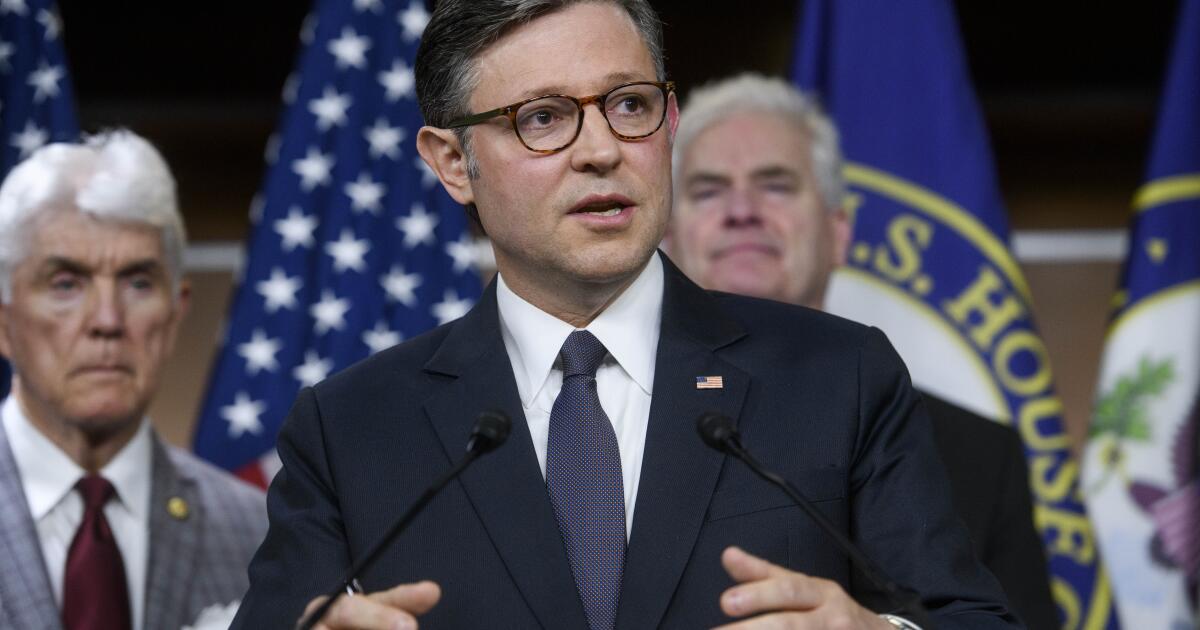Senate Republicans seek tougher Medicaid cuts and lower SALT deduction in Trump’s big bill
WASHINGTON — Senate Republicans on Monday proposed deeper Medicaid cuts, including new work requirements for parents of teens, as a way to offset the costs of making President Trump’s tax breaks more permanent in draft legislation unveiled for his “Big Beautiful Bill.”
The proposals from Republicans keep in place the current $10,000 deduction of state and local taxes, called SALT, drawing quick blowback from GOP lawmakers from New York and other high-tax states, who fought for a $40,000 cap in the House-passed bill. Senators insisted negotiations continue.
The Senate draft also enhances Trump’s proposed new tax break for seniors, with a bigger $6,000 deduction for low- to moderate-income senior households earning no more than $75,000 a year for singles, $150,000 for couples.
All told, the text unveiled by the Senate Finance Committee’s Republicans provides the most comprehensive look yet at changes the GOP senators want to make to the 1,000-page package approved by House Republicans last month. GOP leaders are pushing to fast-track the bill for a vote by Trump’s Fourth of July deadline.
Sen. Mike Crapo (R-Idaho), the chairman, said the proposal would prevent a tax hike and achieve “significant savings” by slashing green energy funds “and targeting waste, fraud and abuse.”
It comes as Americans broadly support levels of funding for popular safety net programs, according to the poll from the Associated Press-NORC Center for Public Affairs Research. Many Americans see Medicaid and food assistance programs as underfunded.
What’s in the “Big Beautiful Bill” so far
Trump’s “Big Beautiful Bill” is the centerpiece of his domestic policy agenda, a hodgepodge of GOP priorities that Republicans are trying to swiftly pass over unified opposition from Democrats — a tall order for the slow-moving Senate.
Fundamental to the package is the extension of some $4.5 trillion in tax breaks approved during his first term, in 2017, that are expiring this year if Congress fails to act. There are also new ones, including no taxes on tips, as well as more than $1 trillion in program cuts.
After the House passed its version, the nonpartisan Congressional Budget Office estimated the bill would add $2.4 trillion to the nation’s deficits over the decade, and leave 10.9 million more people without health insurance, due largely to the proposed new work requirements and other changes.
The biggest tax breaks, some $12,000 a year, would go to the wealthiest households, CBO said, while the poorest would see a tax hike of roughly $1,600. Middle-income households would see tax breaks of $500 to $1,000 a year, CBO said.
Both the House and Senate packages are eyeing a massive $350-billion buildup of Homeland Security and Pentagon funds, including some $175 billion for Trump’s mass deportation efforts, such as the hiring of 10,000 more officers for Immigration and Customs Enforcement, or ICE.
This comes as protests over deporting migrants have erupted nationwide — including the stunning handcuffing of Sen. Alex Padilla last week in Los Angeles — and as deficit hawks such as Kentucky Sen. Rand Paul are questioning the vast spending on Homeland Security.
Senate Democratic Leader Charles E. Schumer warned that the Senate GOP’s draft “cuts to Medicaid are deeper and more devastating than even the Republican House’s disaster of a bill.”
Trade-offs in bill risk GOP support
As the package now moves to the Senate, the changes to Medicaid, SALT and green energy programs are part of a series of trade-offs GOP leaders are making as they try to push the package to passage with their slim majorities, with almost no votes to spare.
But criticism of the Senate’s version came quickly after House Speaker Mike Johnson warned senators of making substantial changes.
“We have been crystal clear that the SALT deal we negotiated in good faith with the Speaker and the White House must remain in the final bill,” the co-chairs of the House SALT caucus, Reps. Young Kim (R-Calif.) and Andrew Garbarino (R-N.Y.), said in a joint statement Monday.
Republican Rep. Nicole Malliotakis of New York posted on X that the $10,000 cap in the Senate bill was not only insulting, but a “slap in the face to the Republican districts that delivered our majority and trifecta” with the White House.
Medicaid and green energy cuts
Some of the largest cost savings in the package come from the GOP plan to impose new work requirements on able-bodied single adults, ages 18 to 64 and without dependents, who receive Medicaid, the health care program used by 80 million Americans.
While the House first proposed the new Medicaid work requirement, it exempted parents with dependents. The Senate’s version broadens the requirement to include parents of children older than 14, as part of their effort to combat waste in the program and push personal responsibility.
Already, the Republicans had proposed expanding work requirements in the Supplemental Nutrition Assistance Program, known as SNAP, to include older Americans up to age 64 and parents of school-age children older than 10. The House had imposed the requirement on parents of children older than 7.
People would need to work 80 hours a month or be engaged in a community service program to qualify.
One Republican, Missouri Sen. Josh Hawley, has joined a few others pushing to save Medicaid from steep cuts — including to the so-called provider tax that almost all states levy on hospitals as a way to help fund their programs.
The Senate plan proposes phasing down that provider tax, which is now up to 6%. Starting in 2027, the Senate looks to gradually lower that threshold until it reaches 3.5% in 2031, with exceptions for nursing homes and intermediate care facilities.
Hawley slammed the Senate bill’s changes on the provider tax. “This needs a lot of work. It’s really concerning and I’m really surprised by it,” he said. “Rural hospitals are going to be in bad shape.”
The Senate also keeps in place the House’s proposed new $35-per-service co-pay imposed on some Medicaid patients who earn more than the poverty line, which is about $32,000 a year for a family of four, with exceptions for some primary, prenatal, pediatric and emergency room care.
And Senate Republicans are seeking a slower phaseout of some Biden-era green energy tax breaks to allow continued develop of wind, solar and other projects that the most conservative Republicans in Congress want to end more quickly. Tax breaks for electric vehicles would be immediately eliminated.
Conservative Republicans say the cuts overall don’t go far enough, and they oppose the bill’s provision to raise the national debt limit by $5 trillion to allow more borrowing to pay the bills.
“We’ve got a ways to go on this one,” said Sen. Ron Johnson (R-Wis.).
Mascaro and Freking write for the Associated Press. AP writers Mary Clare Jalonick and Matthew Daly contributed to this report.


